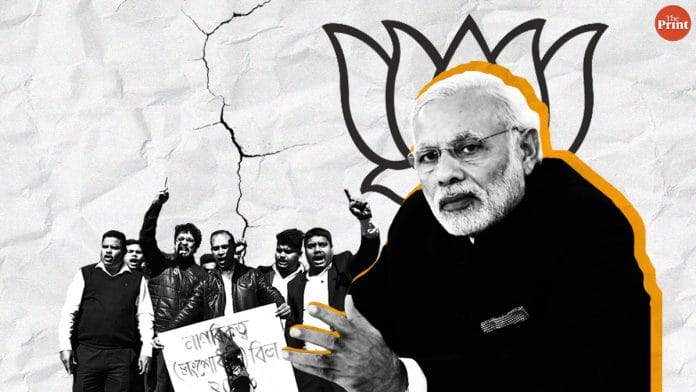Protesters in BJP-ruled Arunachal Pradesh are up in arms against a panel’s recommendation to grant permanent resident certificate (PRC) to six non-native communities. They reportedly tried to burn down CM Pema Khandu’s residence Sunday after torching his deputy’s house. In Assam, PM Narendra Modi was earlier greeted with black flags over the Citizenship Bill.
ThePrint asks: Is the BJP’s identity politics, first with Citizenship Bill and now PRC, a self-goal in the northeast or will polarisation help it in Lok Sabha polls?
BJP shoving its Hindutva ideology has forced northeast citizens to react in unprecedented manner
 Gaurav Gogoi
Gaurav Gogoi
MP, Congress
BJP’s authoritarian politics in the northeast, which happens to be one of the most diverse regions in the country, is disgraceful. In their desire to impose a
homogenous Hindutva identity, the BJP is losing out on appreciating the uniqueness the various tribes and ethnic communities bring to the table.
It is precisely because the BJP is trying to shove these ideologies down the throats of the people of northeast, that they are reacting in an unprecedented manner. Earlier, citizens in Assam were forced to take to the streets and protest against the Citizenship Bill, and now the people of Arunachal Pradesh have reacted by taking the law in their own hands due to the PRC issue.
No doubt the BJP’s agenda is to polarise the northeast region on religious and ethnic lines, but the people are resisting them actively. Every state in the northeast has its own set of complexities. The region has alternated between insurgency/violence and peace/harmony several times in the past. It finally attained some peace in the last decade, but the BJP’s policies risk sending northeast down that road of violence once again. As it is, their rule has greatly damaged things in Kashmir, and now they are attempting to do the same in northeast.
Congress is stoking sentiments by politicising PRC
 Rajat Sethi
Rajat Sethi
BJP strategist and political advisor to the Manipur CM
It is incorrect to try to frame the timeline as something that began with the Citizenship Amendment Bill and is now being succeeded by the permanent resident certificate issue.
The issue of identity is close to the very existence of the people of northeast, and so their problems must be understood in that context. Their aspirations must be dealt with carefully by all political parties. Politicising it unnecessarily is not only very misleading but also demeaning to the people of the northeast.
As far as the issue of PRC is concerned, several Assamese communities living in Arunachal Pradesh have been demanding the certificate for decades. But the matter is unravelling in this fashion only now precisely because elections are around the corner. If this debate had been taken up at any other time, the Congress wouldn’t have cared.
The Arunachal Pradesh government made it abundantly clear that it will not take a decision on the PRC nor will it revisit it again. Despite this, we saw violent protests taking place. The Congress has played a pivotal role in stoking the people’s sentiments.
Issues like PRC go beyond elections or electoral politics. These are considered intractable matters and need long-term resolution. The Congress needed to be mature and not flare up sentiments in the manner it did.
Northeast youth uncomfortable with lack of space for their regional identities in BJP’s right-centric narrative
 Tongam Rina
Tongam Rina
Associate editor, The Arunachal Times
It’s a clear self-goal. The BJP’s blunder was that it politicised the issue of identity — both in Assam and now in Arunachal Pradesh. If the BJP had studied history, which clearly is not its strong point, the party would have known that identity is an important issue that has shaped the direction of the communities in the northeast region.
After bulldozing the Citizenship Amendment Bill in Assam, its government in Arunachal Pradesh came up with the idea of giving permanent resident certificates (PRCs) to non-tribal communities. This was just another political move taken in hurry that turned bitterly violent.
However, it is unlikely that there will be any major implication on the BJP’s electoral fortunes, at least not in the legislative elections as people vote for candidates and not necessarily on party affiliation.
Electoral politics is guided by various considerations like clan affiliations and individual tribe sentiments. Apart from these, money also plays an important role.
Identity is community based and electoral decisions are individual choices. Therefore, sometimes community does not play a major role on the choice of representation.
However, it is not going to be a smooth ride for the BJP in the region, especially among the young voters. They seem to be uncomfortable with the BJP’s larger construct of Right-wing centric national identity where young people and their regional identities do not find space.
Giving domicile status to those outside the dominant social coalition is affirmation of basic liberal values
 Abhinav Borbora
Abhinav Borbora
Political analyst
The question of granting permanent resident certificate is inevitably up against a broad constituency of entrenched interests. This explains the violent reaction that has unfolded over the past few days in Arunachal Pradesh.
PRC is an acknowledgement of the domicile status of an individual and it helps in availing education and employment opportunities. Politics that attempts to bestow such ‘enabling conditions’ upon deprived sections of the population mark a positive break. The state government’s proposition to extend such a status to marginal groups that lie outside the dominant social coalition could be seen as an affirmation of basic liberal values. In this regard, it would be ingenuous to attribute the backlash as a mere response to dubious intent of the government.
Instead, this episode in Itanagar discloses the rigidly hierarchised underbelly of tribal politics in northeast India. Such interpretations go against idealised notions of hill politics and therefore remain well concealed.
But, as the Bru-Mizo conflict has also highlighted, notions of race and alterity constitute one of the dominant assumptions of hill politics and by the same logic, determine access to rights and opportunities. Of course, the BJP’s liberal credentials would have been better justified if it would have demonstrated similar compassion towards the Rohingyas.
It’s dangerous to impose a single social formula across India, especially on a tribal population
 Oken Tayeng
Oken Tayeng
Travel Historian, Arunachal Pradesh
Ideally, the BJP should have calculated and foreseen the disastrous repercussions of its proposed move to grant permanent resident certificate to non-tribals. It’s simply not pragmatic to impose a single social formula across India. It’s more dangerous to attempt doing this with a tribal population as they value their kinship and sense of identity to a great extent — and may sometimes be forced to even guard it ferociously. These are people who feel like their sense of identity is under threat, and so they will obviously feel the need to protect it. This should not come as a surprise.
The demand of PRC by the non-native communities does hold merit and may be based on legitimate grounds. But that doesn’t imply that the sentiments and interests of the larger indigenous natives should be discounted and forgotten. They deserve attention and respect. Sometimes, it’s better not to rustle things to ensure peace and stability of a region. The BJP must understand this.
As far as political gains are concerned, the demarcation of domicile is a very delicate matter; it should never be used as a political tool. These moves are dangerous, and show the lack of in-depth understanding of the socio-cultural temperament of Arunachal Pradesh.
By Fatima Khan, journalist at ThePrint.






